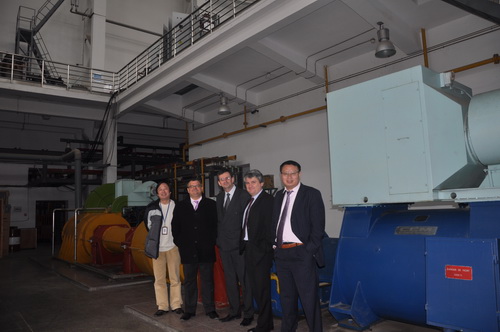Minister’s Visit Shows Weight of China-France Ties at 60

In the 1980s, the French Alternative Energies and Atomic Energy Commission gave a flywheel generator unit to the Institute of Plasma Physics, Chinese Academy of Sciences, and the Hefei Institutes of Physical Science. (PHOTO: HFIPS)
By Tang Zhexiao
French Minister for Europe and Foreign Affairs Stephane Sejourne’s visit to China on April 1, within three months of assuming office, reflects the great importance France attaches to its relations with China.
This year marks the 60th anniversary of the establishment of diplomatic ties between China and France. Since the beginning of the year, the two countries have engaged in a series of high-level exchanges, giving bilateral ties renewed vigor and vitality.
France is seeking more strategically stable and forward-looking China-France relations. During Sejourne's visit, the two sides agreed to lead innovative development, deepen cooperation in traditional areas such as aviation and aerospace, nuclear energy, agriculture and finance, and explore cooperation in emerging areas such as green transition and intelligent manufacturing, according to the Chinese Ministry of Foreign Affairs.
Looking back at history, China-France science and technology cooperation has made significant achievements. In the 1980s, the French Atomic Energy Commission donated a flywheel generator to the Hefei Institutes of Physical Science in east China for the construction of the Hefei Tokamak-7, an experimental superconducting tokamak nuclear fusion reactor.
Other joint projects have consolidated the relationship. They include the international thermonuclear experimental reactor, known as the world's largest "artificial sun", as well as the management of aging nuclear power plants. Liu Jing, deputy director of China Atomic Energy Authority, said the China- France technological cooperation has injected new connotation and vitality into their nuclear energy cooperation.
During French President Emmanuel Macron's visit to Beijing in 2023, the two countries signed a pact on future sci-tech cooperation, notably renewable energy.
Space technology is also an area of close cooperation. The Space Variable Objects Monitor (SVOM) is the first astronomical satellite jointly developed by China and France.
Karine Mercier, payload manager of the French National Center For Space Studies, said, “The cooperation is very pleasant because we have worked together for a long time.” Currently, she and her other French colleagues are working on a project at the Innovation Academy for Microsatellites in Shanghai, where the SVOM is being assembled.
Being comprehensive strategic partners, China and France’s common interests far outweigh their differences. France has stressed that it will work with China to address global challenges such as climate change and biodiversity conservation to improve global governance, giving more stability to a turbulent world.







